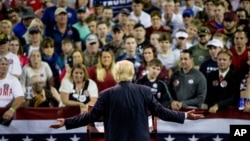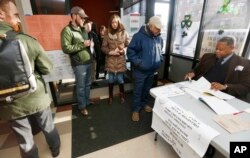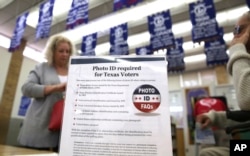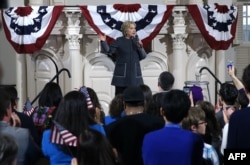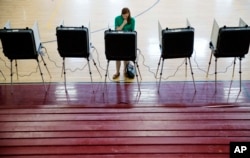Voters across 12 states helped decide their parties’ nominees in the 2016 presidential campaign, providing a clearer picture of the battle Donald Trump may trigger in the Republican Party and maybe hinting as to how he might do in a general election.
Trump headed into Super Tuesday, the campaign’s single biggest day of voting, with three straight wins, a 4-1 delegate lead, and endorsements from New Jersey governor Chris Christie and several members of Congress.
Analysts said his showing in so-called “purple states,” states that can go to either the Democrats or Republicans in presidential elections, would be the most detailed test of his strength as a candidate.
One of those states was Massachusetts, where a strong showing for Trump could be a key test of his appeal with working-class conservative Democrats willing to cross over and vote Republican on economic issues, said Republican strategist Ron Bonjean.
“If he did really poorly there, that’s an indicator of what the general election could look like,” he said.
Trump did not do poorly. He won 49 percent of the vote in Massachusetts while no rival earned more than 18 percent.
Marco Rubio, the freshman Florida Senator looking to unite the Republican establishment around his candidacy, adopted Trump’s strategy of personal attacks in recent days, mocking the frontrunner’s appearance and demeanor.
Rubio, who had yet to win a nominating contest heading into Tuesday, needed to show well against his other opponent, Ted Cruz, to stay in the contest until March 15th.
“Marco Rubio has been campaigning quite a bit in Virginia in the past few days, so he might think he has a shot there,” said Bonjean.
Virginia, a key battleground state in past Presidential elections, allows residents to vote in either party’s presidential primary, leaving the field wide open for independent-minded voters. Rubio was strong in Virginia, getting 32 percent of the vote, but not enough to beat Trump's 35 percent.
Meanwhile, Ted Cruz staked his data-focused campaign on winning delegates in his home state of Texas. Cruz likes to remind voters he beat Trump in the Iowa caucus. But the Texas senator has lost momentum since that win a month ago, slowed by accusations his campaign plays dirty tricks on other candidates and an unexpectedly poor showing among evangelical voters in South Carolina.
“People are coalescing behind Rubio,” said Democratic pollster Margie Omero.
Cruz’ home state was the big prize in Super Tuesday voting, awarding the highest number of delegates of any contest. His campaign’s strategy focused on winning delegates district by district, rather than a win statewide. He won 44 percent of the vote in Texas, beating out Trump's 27 percent.
Bonjean said ahead of Tuesday's results that a strong showing by Trump would result in a number of additional establishment conservatives coming out to support him, triggering questions about who controls the Republican party.
Geographic advantage
Hillary Clinton went into the Super Tuesday vote following a resounding victory in the South Carolina primary last Saturday. Clinton’s 47-percentage point win over Senator Bernie Sanders helped calm doubts about her candidacy after close contests in early voting states.
“Whatever happens today will come out with an advantage for Clinton,” said Omero. Clinton holds strong leads among Latino and African-Americans, populations that make up a large portion of the voters in southern states that voted on Super Tuesday.
In recent days, the Sanders campaign focused on states with smaller delegate numbers, but friendlier demographics. If Sanders could perform well in states with white liberal populations like Massachusetts, Colorado, Minnesota and his home state of Vermont, then he could prevent Clinton from amassing an insurmountable delegate total and keep going with primary voting well into June.
Sanders took three of the four, losing only Massachusetts to Clinton.
Sanders’ strategy depends in large measure on generating voter enthusiasm, particularly among younger voters who have appeared resistant to Clinton. After voting Tuesday in Burlington, Vermont, Sanders told reporters if voter turnout is high "we are going to do well. If not, we're probably going to be struggling.''
Clinton appeared confident campaigning in the days before Super Tuesday. She ignored her opponent, Sanders, focusing on a potential general election battle with Donald Trump.
The Republican frontrunner also appeared to be looking ahead to November. Trump said Tuesday, "I can tell you the one person Hillary Clinton doesn't want to run against is me.''
Omero said the Super Tuesday results should not be the final word on a Trump general election run.
“Republican elder statesmen can be more forceful and more clear,” she said. “Have Republican women come out and say the way he speaks is unacceptable. There can be a third-party run by other candidates to try and siphon votes away from Trump. There should be no stone left unturned, rather than throw up our hands and say oh well.”




